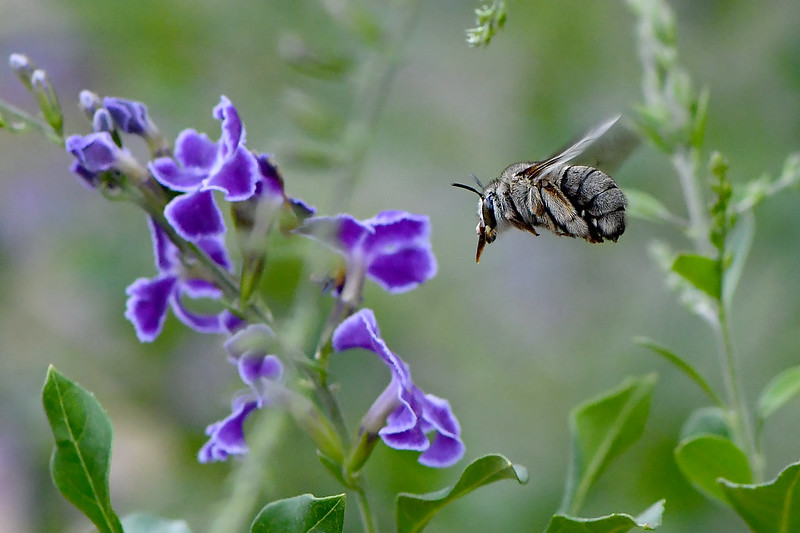
Planet A
A new study has recommended that 11 species of Australian bees be listed as threatened, a five-fold increase, due to the 2019–20 bushfires. Lower bee populations threaten crop production, with consequences for Australia’s agriculture and economy.
Bee populations are highly sensitive to changing weather patterns. Even gradual increases in temperature caused by climate change decrease bee pollination activity and disrupt their relationship with flowering plants. Agricultural use of pesticides and monoculture crops is also associated with declines in bee numbers.
This is a global phenomenon. Climate-change-induced weather fluctuations have reduced honey production in Slovenia by as much as 90%; the American bumblebee is expected to be listed as endangered after an 89% reduction in population; and the development of beeless honey anticipates that future bee numbers won’t meet demand.
Bees are critical to the reproduction of three-quarters of food-producing plants. Dwindling populations are both a result of and an exacerbating factor in climate change, and threaten agriculture globally. The way bees react to climate change is therefore crucial to understanding future climate-change-related threats.
Democracy watch
The left-wing vote collapsed in last week’s Czech elections, with both the Social Democratic Party and Communist Party losing all their seats after failing to meet the 5% threshold. The two parties had supported the minority government of billionaire Andrej Babis, who was named in the leaked Pandora Papers days before the election. After its defeat, Babis’s ANO party has no viable road to power, so governance will likely pass to the liberal–conservative coalition, Together.
The tense political situation was further complicated after Czech President Milos Zeman fell ill and was taken into intensive care. The president plays a key role in the formation of government. As Babis’s most powerful backer and sole potential saviour, Zeman had repeatedly promised to reappoint him as prime minister despite the election defeat. The vacuum created by Zeman’s absence could allow Babis to remain in power for months.
Babis, who has been accused of driving Czechia’s anti-EU and illiberal drift alongside political allies Hungary and Poland, has been the subject of numerous corruption scandals and investigations. While ANO’s defeat appears to be a win for pro-EU forces in Czechia, Zeman’s incapacitation could propel the country into a constitutional crisis.
Information operations
Last week, hundreds of Americans rallied in New York to protest both the state’s vaccine mandates and Australia’s lockdown restrictions, with crowds chanting ‘Save Australia!’ outside the Australian consulate. The protests, which confused Australians online, reflected a months-long campaign by US conservative media to portray Australia’s Covid-19 response as evidence that the country had become an authoritarian dystopia.
Mainstream and fringe voices from the Australian right have played a prominent role in shaping this narrative, amplified by their American conservative counterparts. Featured guests have included Institute for Public Affairs Director Gideon Rozner, who remarked that Australia wasn’t a functioning liberal democracy; self-proclaimed ‘freedom lawyer’ Tony Nikolic, who is suing the NSW government over vaccine requirements; and MP George Christensen, whose question time anti-lockdown speech was condemned by parliament and removed from Facebook as Covid misinformation.
The Save Australia rally exemplifies the rise in right-wing political mobilisation based on conspiracy theories throughout the pandemic, and the intensifying feedback loop between those in the US and Australia.
Follow the money
The Pandora Papers have illuminated connections between Australian accountant Graeme Briggs, chairman of the Singapore-based Asiaciti Trust, and Samoa’s offshore finance industry. In one document, Briggs is described by a Samoan official as the ‘grandfather of the offshore industry’ due to his role in finding legal ways for wealthy foreign clients to avoid paying income tax.
Asiaciti set up superannuation funds in Samoa, enabling businesses from Belgium, Canada, France, Germany, Japan, New Zealand, Russia and the US to reduce or avoid tax in their home countries. Media reports say that by helping high-risk clients, Briggs accumulated a fortune worth $62 million.
The Australian Taxation Office has investigated tax avoidance using offshore industries, but it says there are many legitimate reasons to have an offshore business structure and that that in itself is not illegal. Some people named as having offshore accounts had in fact provided the ATO with details of them, as required. Approximately 400 Australians were named in the Pandora Papers, raising questions about the volume of tax dollars lost to the Australian economy.
Terror byte
Australian Federal Police Assistant Commissioner Scott Lee has revealed that far-right extremism cases handled by the agency’s Joint Counter Terrorism Team had increased by 750% in the past 18 months. Lee says that nationalist and violent racist extremism now accounts for 15% of the team’s workload and expects cases will continue to climb with the pandemic being a key driver of far-right radicalisation.
This follows trends identified by the Australian Security Intelligence Organisation earlier this year when its director-general, Mike Burgess, said racist and nationalistic ideologies were of particular concern with a greater online presence during the pandemic. Analysts assert that Covid-19 has fuelled racist rhetoric in countries such as the US and the UK, and across Europe. Conspiracy theories such as the claim that big pharma orchestrates the virus have been difficult for governments and social media companies to counteract.

